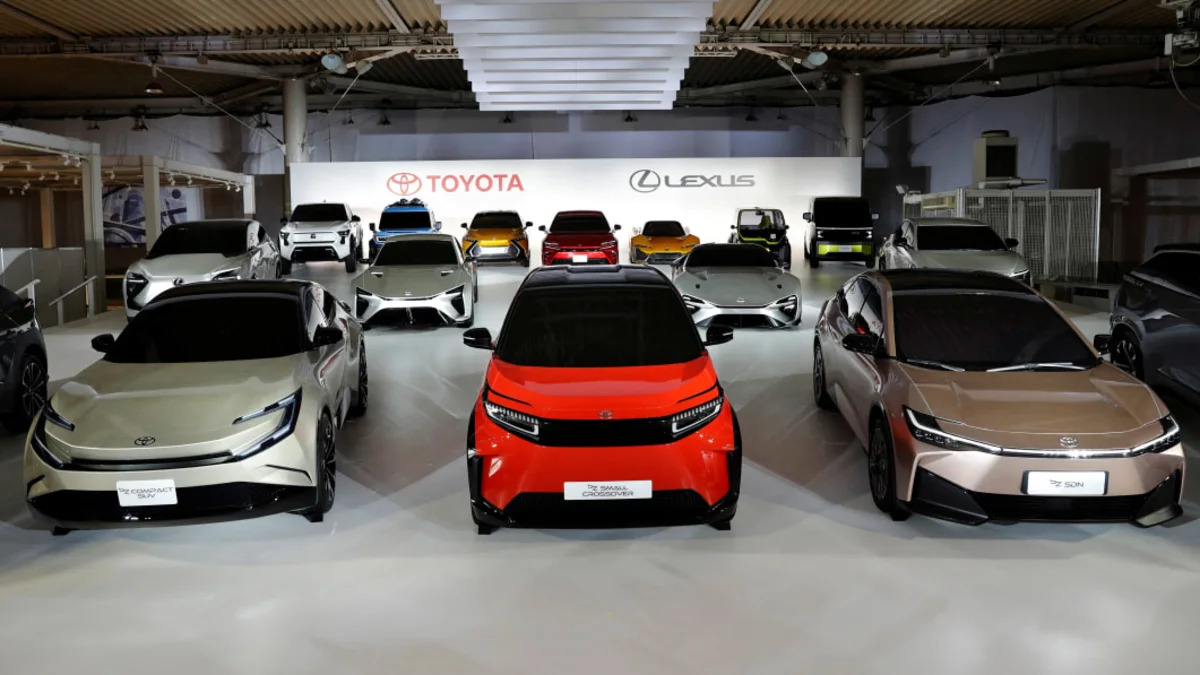Did you hear the news? Toyota is ramping up its production of electric vehicles (EVs) with a goal of producing over 600,000 vehicles by 2025. According to a report in the Nikkei newspaper, the Japanese automaker plans to increase its output of battery-powered vehicles over the next few years, aiming to reach the ambitious target by 2025. While Toyota has not officially commented on the report, it has previously stated its goal of selling 1.5 million EVs annually by 2026 and 3.5 million by 2030. This move signifies Toyota’s commitment to the growing market for electric vehicles and its determination to be a key player in this industry. Exciting times are ahead for Toyota and the EV market!
Toyota’s Plan to Accelerate EV Production
Toyota to increase EV production
Toyota Motor is set to ramp up the production of electric vehicles (EVs) for its Toyota and luxury Lexus brands, according to a report by the Nikkei newspaper. The Japanese automaker is aiming to significantly increase its output of battery-powered vehicles over the next few years and target an annual production of over 600,000 EVs by 2025. This move aligns with Toyota’s ambition to strengthen its position in the EV market and meet the growing demand for electric vehicles worldwide.
Current State of Toyota’s EV Sales
Despite being a prominent player in the global automotive industry, Toyota’s sales of EVs have been relatively low compared to its competitors. In 2022, Toyota sold fewer than 25,000 EVs, including vehicles from its luxury brand, Lexus, worldwide. However, the company has recognized the need to prioritize the production and sales of EVs in order to meet the evolving market demand and emission regulations.
Plans to increase EV production in 2023
Toyota has set its sights on increasing its EV production in the coming years. In 2023, the company aims to produce about 150,000 EVs, and it plans to gradually increase this number to the range of 190,000 vehicles by the following year. These targets demonstrate Toyota’s commitment to expanding its EV lineup and keeping up with the industry’s shift towards electric mobility.
Toyota’s Goals for EV Sales
Looking ahead, Toyota has ambitious goals for EV sales. The company aims to sell 1.5 million EVs annually by 2026, paving the way for a significant share of the global EV market. By 2030, Toyota targets an even more substantial milestone of 3.5 million EV sales, which would represent about one-third of the current global volume. These goals underline Toyota’s commitment to the electrification of the automotive industry and its determination to remain a leading player in the market.
Potential Impact on Global Automotive Market
Toyota’s decision to accelerate its EV production will have a significant impact on the global automotive market. As one of the largest automakers globally, Toyota has the ability to shape the industry’s transition towards electric mobility. By increasing its EV production and sales, Toyota can encourage other automakers to follow suit, further accelerating the adoption of electric vehicles worldwide.
Competitive advantages and challenges in the EV market
Toyota possesses several competitive advantages that can contribute to its success in the EV market. The company has a strong brand reputation built on reliability, quality, and innovation, which can attract customers to its EV offerings. Additionally, Toyota’s extensive global manufacturing and distribution network provide a solid foundation for scaling up EV production and reaching customers in various markets.
However, the EV market also presents significant challenges. Automakers face increasing competition, technological advancements, and changing consumer preferences. To maintain its competitive edge, Toyota must continue to invest in research and development, stay at the forefront of EV technology, and deliver products that meet customer expectations in terms of range, performance, and affordability.
Expansion of Toyota’s EV Manufacturing Facilities
To meet the growing demand for EVs and achieve its production targets, Toyota plans to expand its EV manufacturing facilities. This expansion involves increasing the manufacturing capacity of existing plants and investing in new production facilities. By expanding its manufacturing capabilities, Toyota can streamline its production processes, reduce costs, and improve efficiency in the production of EVs.
Toyota’s Collaboration with Battery Manufacturers
A crucial aspect of increasing EV production is ensuring a sufficient and reliable supply of batteries. To address this challenge, Toyota is collaborating with battery manufacturers to secure a stable supply of high-quality batteries for its EVs. This collaboration aims to leverage the expertise of battery manufacturers in developing advanced battery technologies, improving energy density, and enhancing the overall performance and durability of EV batteries.
The Role of Government Policies and Incentives
Government policies and incentives play a significant role in shaping the trajectory of the EV industry. As governments worldwide strive to reduce carbon emissions and combat climate change, they are implementing policies that promote the adoption of EVs. These policies include regulations that encourage automakers to produce more EVs and provide incentives such as subsidies and tax credits to make EVs more affordable for consumers.
The impact of government policies and incentives on EV production cannot be underestimated. They create a favorable environment for automakers like Toyota to invest in EV manufacturing, research, and development. As governments continue to prioritize sustainability and environmental stewardship, their support can further accelerate the growth of the EV market.
Potential Challenges in Achieving Production Targets
Although Toyota is committed to increasing its EV production, several challenges need to be addressed to achieve its targets. One of the main challenges is the potential constraints in the EV supply chain, including the availability of raw materials and components. Uncertainties in the global supply chain, including the shortage of semiconductor chips, can cause delays and disruptions in production.
Furthermore, overcoming technological and infrastructure challenges is crucial. Toyota must continue to invest in developing advanced EV technologies, such as longer-range batteries, faster charging, and improved vehicle connectivity. Additionally, expanding the charging infrastructure to support the widespread adoption of EVs is essential for customer convenience and confidence in the technology.
Toyota’s Plans for Future EV Models
As part of its commitment to innovation and advanced technology, Toyota plans to introduce new EV models in the coming years. These models will showcase Toyota’s engineering excellence, performance, and design. Toyota’s dedication to innovation and its ability to integrate cutting-edge technologies into its vehicles will contribute to the overall advancement of the EV market.
The Implications for the Overall Automotive Industry
Toyota’s plan to accelerate EV production has far-reaching implications for the entire automotive industry. As one of the world’s leading automakers, Toyota’s commitment to electric mobility reinforces the industry’s shift away from internal combustion engines and towards sustainable transportation. Toyota’s influence can inspire other automakers to prioritize EV production, creating a more competitive market that benefits customers and the environment.
Moreover, Toyota’s increased EV production will impact market dynamics, potentially challenging traditional automakers that have been slow to pivot towards electrification. Toyota’s successful expansion in the EV market could serve as a benchmark for other automakers that are seeking to establish a dominant presence in the rapidly growing electric vehicle sector.
In conclusion, Toyota’s plan to accelerate EV production demonstrates its commitment to driving the future of mobility. By increasing its EV production and sales, Toyota aims to become a significant player in the global EV market. Through collaborations, investments, and adherence to government policies, Toyota is paving the way for a sustainable and electrified automotive industry. As Toyota continues to innovate and introduce new EV models, its influence on the overall automotive industry will undoubtedly be transformative.
Please rate this post

With over 20 years of experience in the car business, I’ve navigated the evolution of the industry from traditional sales to the dynamic digital age. My journey through various roles in both sales and management has endowed me with a unique perspective on the challenges and opportunities in automotive sales today.
As the founder of Shawn Ryder Digital, I combine my extensive background in technology with my deep understanding of the automotive industry. This synergy allows me to craft digital marketing strategies that are not just effective but tailored to the specific needs of each dealership. My commitment is to drive your sales, enhance your brand awareness, and ensure your dealership thrives in the digital landscape.
Here at Shawn Ryder Digital, we’re not just about providing services; we’re about building partnerships. As I often say, “In the fast-paced world of digital marketing, staying ahead isn’t just an option; it’s a necessity.”
Together, let’s embrace the challenges of the digital age and turn them into opportunities for growth and success. Join me in redefining the future of automotive digital marketing. Let’s accelerate your dealership’s journey to the top.

